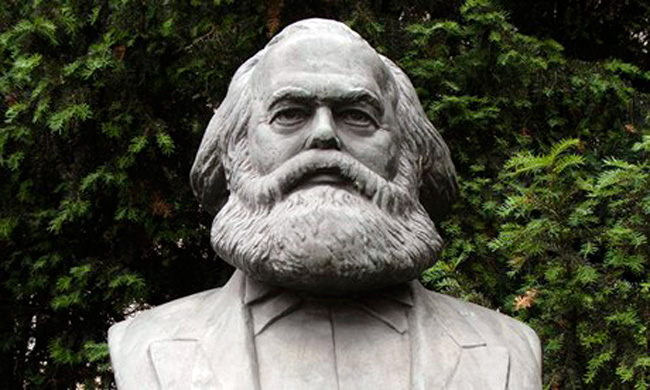The Delusional Karl Marx

Prepare yourself for a fantastical Karl Marx quote.
It’s the sort of statement a young person in college might find inspiring, if he had the ability to read it and understand it.
An increasing number of young college students want to believe in a better, more attractive future, in which little or no work will be required of them.
They’ll be provided a “free life.” Housing, food, clothing, an array of consumer items.
They want something resembling college life forever.
Here is the Karl Marx quote:
“For as soon as the distribution of labour comes into being, each man has a particular exclusive sphere of activity, which is forced upon him and from which he cannot escape. He is a hunter, a fisherman, a shepherd, or a critical critic and must remain so if he does not wish to lose his means of livelihood; while in communist society, where nobody has one exclusive sphere of activity but each can become accomplished in any branch he wishes, society regulates the general production and thus makes it possible for me to do one thing today and another tomorrow, to hunt in the morning, to fish in the afternoon, rear cattle in the evening, criticize after dinner, just as I have in mind, without ever becoming hunter, fisherman, shepherd or critic.” (The German Ideology, 1845-46)
I’ll break down Marx’s stunning assertion, section by section.
First, he claims the “division of labor” brings on unwanted consequences. What does that “division” phrase mean? Does it mean someone somewhere, once upon a time, came up with the weird notion that, if you wanted to build a temple, you would have different people work on different aspects of the overall job? Is that what division means?
You could have built the temple with “all the workers doing all the jobs,” but some evil wizard imposed the idea, arbitrarily, that different workers with different skills ought to shape the stones, put them in place, design the overall support structure, execute sculptures, and so on?
This was the cardinal first sin?
Apparently so.
Marx then claims that the division of labor specifically leads to people having certain jobs forced on them, from which they can’t escape. Is that a sound inference? Had he never heard of or encountered people who started their own businesses, their own farms? Had he never heard of people who decided to change one type of work for another?
Moving right along—Marx utters this astonishing phrase: “…in communist society, where nobody has one exclusive sphere of activity but each can become accomplished in any branch he wishes…”
Which Communist society will that be? Under a Dictatorship of the Proletariat, the people will be able to choose the direction of their lives? Pick their professions, one after another? A farmer can sell his land to a buyer and move to the city and publish a newspaper?
No, that is what can happen in a free market society.
Next, Marx states that “society regulates the general production.” He’s talking about production of goods and services under Communism. But who is this “society?” Everybody? It appears so. Everybody gathers in a great field and intelligently debates how the economy will operate and what and how much it will produce…and then the miracle will come to pass? None of the population will actually go to work making those production quotas come true? It will just happen?
Well, you would think so, from what Marx describes next: “…society regulates the general production and thus makes it possible for me to do one thing today and another tomorrow, to hunt in the morning, to fish in the afternoon, rear cattle in the evening, criticize after dinner, just as I have in mind, without ever becoming hunter, fisherman, shepherd or critic.”
In other words, Marx would live for free, unemployed, and do whatever he wants when he wants. And so could everyone else—but somehow the national production of goods and services gets done.
Magic. The magic of the Communist State.
I recommend Marx’s passage to teachers of logic. Have your students chew on it for a week, take it apart, analyze it. It’s a masterpiece of fallacies, taken to the extreme.
And by the way, there is no indication Marx was anticipating a society in which machines and AI would do all the work. If this were his ace in the hole, he would have to re-think his famous “workers of the world unite,” because there would be no human workers, aside from those who monitored and repaired the machines…





















